The future is the next generation, and I am a firm believer in building up the next set of Christians to empower them to go out and do amazing feats. This is why the youth ministry curriculum you use is so incredibly important, as it can make or break a youth group or ministry.
Sure, it is nice to have fun, play games, and eat pizza at youth groups. But the goal should be to dig deeper into the Bible and learn more about the Word of God. After all, your church youth group is a fundamental part of your church's efforts to create disciples and thus fulfill the Great Commission. It should be done in a way that students and teens learn and grow in their walk, long before they become an adult set in their ways.
During my time serving our youth at Angelus Temple in Los Angeles, California for years, we built our own curriculum to use. While this is the optimal option, you can’t start out that way. As such, here are some of the best youth ministry curriculums you can use as a jumping off point for making your youth group the best it can be.
What Is A Youth Ministry Curriculum?
Your youth ministry curriculum is the material you use in church to teach and help people to grow. It is basically like the modernized, lesson-based system that takes elements from the Bible and turns into a sermon. There are many parts to it, which is why it is a bit different from simply reading text from the Bible itself.
Curriculum usually has scriptures from the Bible organized around a theme. There could be extra stories or references from outside of the Bible to complement the material. This material typically also has questions, call to actions, and the like to go beyond simply talking about a lesson.
Youth ministry curriculum is your go-to method of teaching the next generation of students and the guiding point for many churches around the world, no matter if you need it for your small group or to empower your youth workers and leadership.
What Is A Youth Ministry?
Youth ministry is one of the most important parts of any church. I am biased but the kids and teens of your church should be your utmost priority, as they are impressionable and the next pastors, leaders, deacons, worship leaders, etc. A youth ministry is a way of organizing the growth and discipleship of the teens in your church.
Youth ministry can come in many different shapes and forms, but the idea is to give students a place to be themselves and learn about God’s Word. It can be in the form of a youth group that meets once or twice a week. Alternatively, it could be a ministry that does weekly or monthly trips and worship services.
Regardless of how your youth ministry is organized, the crux of it is centering everything around the kids, students, and teens in your church. In general, youth ministry itself tends to lean towards middle/junior high school and high school/secondary school students.
Children’s church, on the other hand, is typically separate and for grade school children.
Benefits of a Youth Ministry Curriculum
The benefit of a youth ministry curriculum is you have tons of materials and lessons immediately available to you. Like I said before, the best situation would be to develop your own lessons and curriculum that is tailor-made for your church, but that takes a lot of time and money.
When starting a youth ministry, the best option is to find the curriculum that works for you and purchase it. You’ll instantly have professional work that you can draw from, which can be a guiding light for your youth group.
High-quality curriculum can simplify and offer ideas that even inexperienced teachers and leaders can use to impart knowledge onto students. Another benefit of the curriculum is that it sets you up for success. It is easy to be a bit aimless and feel overwhelmed when coming up with weekly or monthly lessons, and this curriculum can help with that.
What Youth Ministry Curriculums Are Available?
There are dozens of youth ministry curriculums out there, many of which are designed for certain types of churches or denominations. With so many options, I narrowed it down to the six that I prefer to recommend. This is due to their flexibility for different types of churches and quality.
1. Live Youth Curriculum
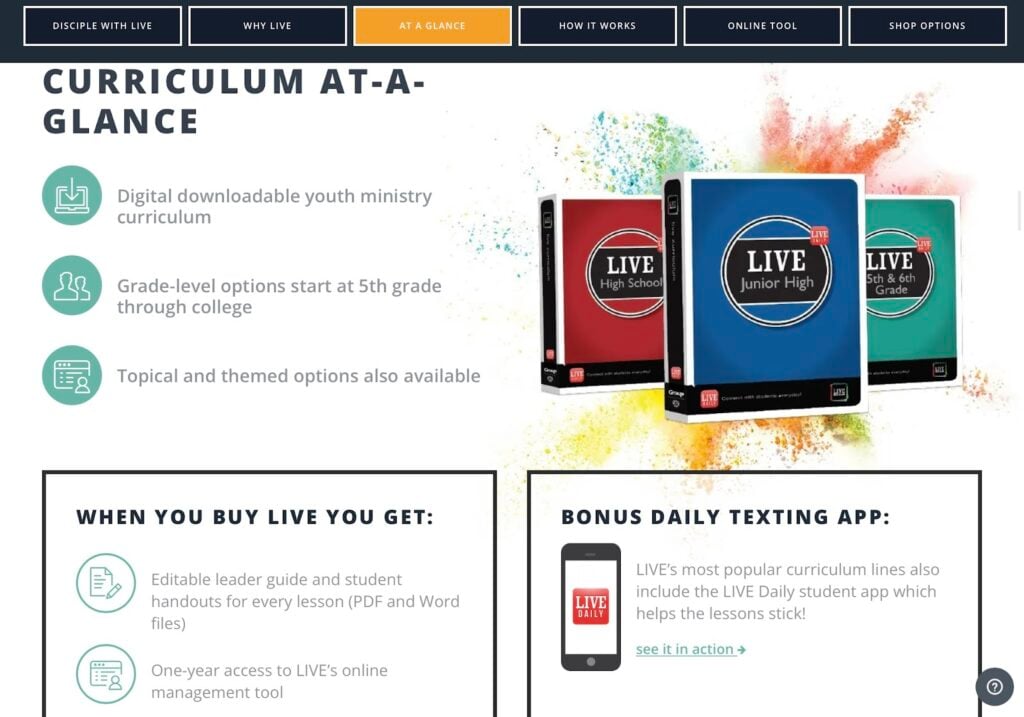
I appreciate the style and objectives of this particular curriculum. They make it all about showing and teaching Jesus Christ to students, which I love. It also has an expansive format that includes student-led discovery, lecture-style approaches, conversational lessons, and more.
2. Grow
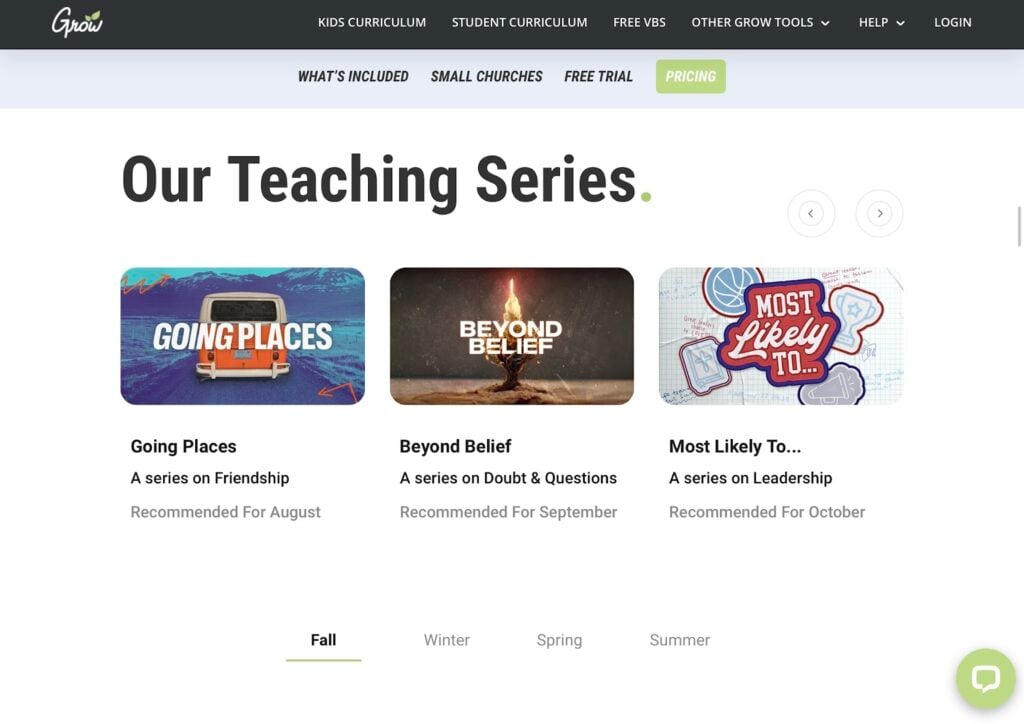
As you can see in the name itself, this curriculum is all about growth. This doesn’t just mean the number of attendees in your youth group, but the growth of their character and walk with God.
It focuses on long-term growth, not short-term, which is so incredibly important for setting up students for spiritual success for the rest of their lives.
3. Rooted
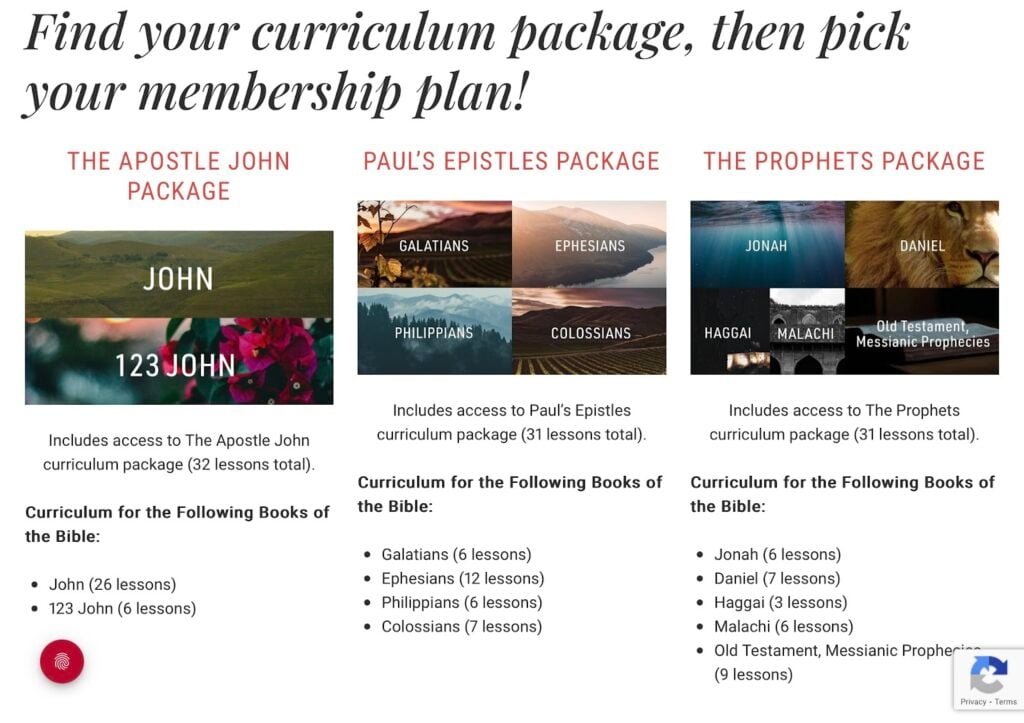
This is a straightforward curriculum and platform. It isn’t like others because it has been built by many youth pastors from across borders. It is meant to be a community, with videos, illustrations, lessons, and more. If you want a comprehensive package that is expertly crafted, this is one to consider.
4. Teen Compass
This is an older resource that focuses on dividing between the notebook for students and the leader guide for the pastors. It takes a more interactive and traditional approach, which might be appealing to some churches.
5. Deep Discipleship
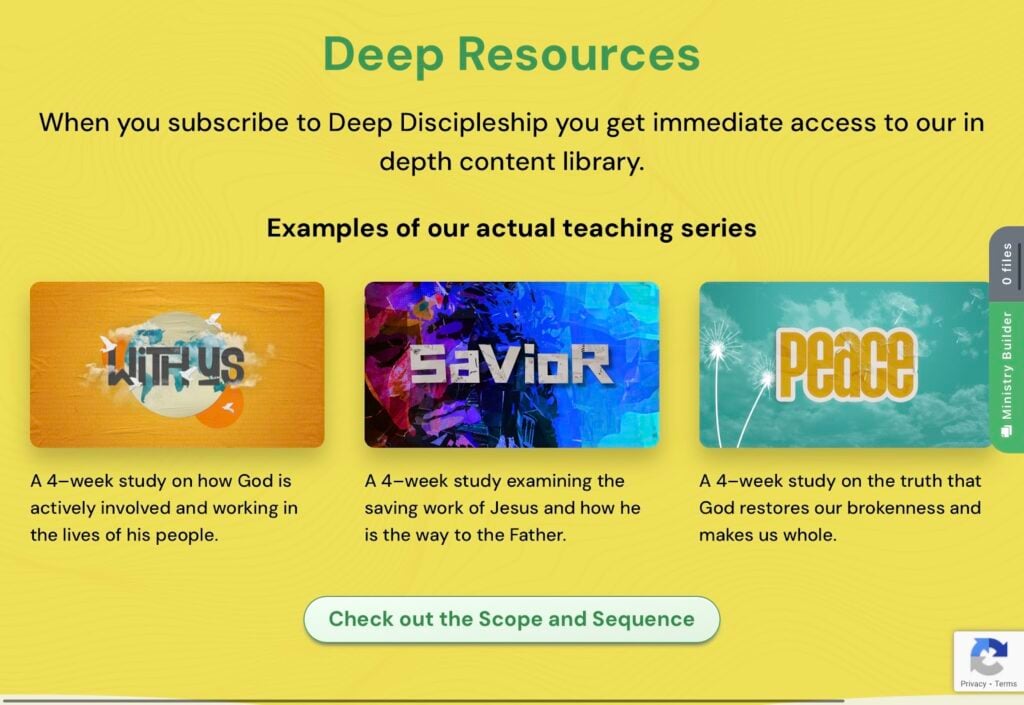
One of the newer programs you can use is this one. As it states in the name, it is all about discipleship. It takes an active approach to instilling Biblical principles into preteens and teens, including the students, their parents, and the leaders in the process.
6. YM360
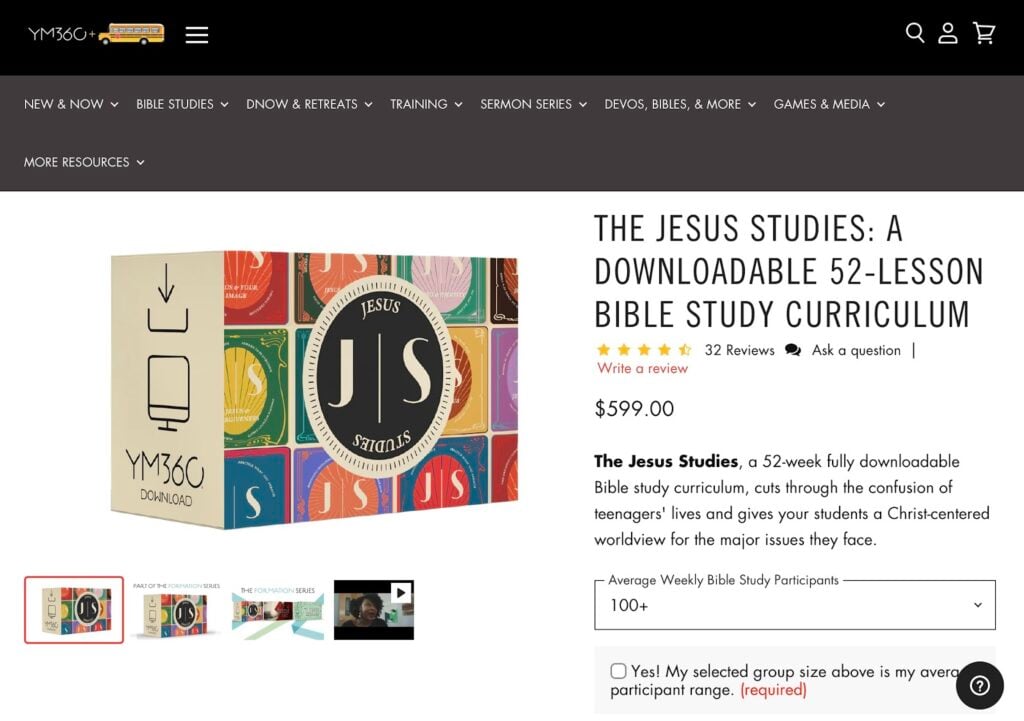
This is one of the most popular and successful youth ministry curriculums around. But you should know that you’ll pay a hefty price. It divides up its material from foundational Bible studies to more specific parts about building faith to pairing lessons with certain movies or themes.
As you might expect, this makes this perhaps the priciest curriculum on this list, but it has a lot of high-quality expertise behind it. It breaks down everything nicely and offers a fair bit of content, depending on what you need, but it is a huge commitment at the same time.
How To Choose A Youth Ministry Curriculum
Coming up with the right youth ministry curriculum is a tough decision. If you make the wrong choice, you could end up being not as effective as you could be and wasting a ton of money. These materials aren’t that cheap.
So, here are some of the pointers I have for determining which curriculum is right for your youth group.
1. Budget Accordingly
Before you purchase or even think about a curriculum, make a budget. Chances are your church already has a budget for its youth group, so factor in how much you think you can spend on curriculum. This could limit your options considerably, so it is best to know now.
Or, it could show that you might need to dedicate more funds to this aspect, if your budget isn’t quite enough. After all, curriculums can be in the hundreds of dollars and certainly reach into the thousands.
2. Find Like-Minded Curriculum
Each of the different youth ministry curriculums out there have a different focus, even if they don’t outright state that.
For instance, a curriculum created by a certain denomination will be geared towards churches of a similar style. If you are part of a specific denomination, search for material that fits you best.
3. Determine Your Intentions
What is your purpose for owning a curriculum? Are you trying to have lessons for your weekly youth church service or monthly ones? Do you focus on smaller Sunday School lessons or larger gatherings? Why you need a curriculum can also determine what works best for you.
4. Pick Your Format
Some curriculums are quite different from others, not just in focus and denomination, but the format. Some are traditional paper-based, which you can pass out to the students. Others have a mix of slideshows, videos, and other eye-popping aspects that fit social media well.
I do suggest variety as much as possible to keep students’ interest, but find what format works best for you.
5. Check Out Every Free Trial
The best curriculums offer a free trial or sample to check it out. This could be a small lesson to give you an idea of how it works or a short time in which you can access the material. I didn’t include a single curriculum that doesn’t offer one of these, and you should never pay for a curriculum that you haven’t sampled before.
Don’t stop with the first curriculum you sample, either. Take time to try out all of the ones above and then compare them. This can help ensure you don’t regret your purchase.
Discipleship Should Be The Goal
At the end of the day, the youth ministry curriculum and the group as a whole is about the students. Your goal should always be to mentor, teach, guide, and disciple these teens. They are at a turning point in their lives where they are easily influenced by everything, so it is crucial that you be a positive influence.
Your purpose in all of this should be to not just make youth group fun, but to also disciple the students. Fortunately, we have already broken down what you need to know about discipleship in the past.
For more tips on starting and running a youth ministry like this, be sure to subscribe to The Lead Pastor newsletter to get our latest guides delivered to your inbox.


